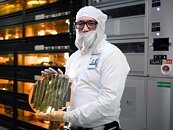- Joined
- Aug 19, 2017
- Messages
- 2,947 (1.06/day)
According to an investment bank UBS note, two industry titans—NVIDIA and Broadcom—are potential future clients that could significantly enhance Intel's Foundry business revenue. To revitalize Intel, newly appointed CEO Lip-Bu Tan reportedly aims to forge strategic alliances with two AI chip manufacturers. Tan, who assumed leadership earlier this month, is determined to rebuild the company's reputation by focusing on customer satisfaction and accelerating the development of its foundry business. UBS analyst Tim Arcuri suggests that while Broadcom might join the client roster, NVIDIA appears to be the more likely candidate. Rather than initially manufacturing NVIDIA's AI GPUs, Intel is expected to begin production with gaming GPUs. NVIDIA could even move to AI GPU production at Intel's fabs if satisfied.
Despite some early optimism, Intel's new CEO is now committed to addressing issues related to power consumption in Intel's manufacturing processes. UBS analyst Tim Arcuri noted that the firm is pushing hard to introduce a lower-power version of its 18A process, the so-called 18AP, which has reportedly struggled to meet energy requirements. Additionally, Intel is working to improve its advanced packaging techniques to rival Taiwan's TSMC CoWoS (S/L/R variants) technology, aiming to overcome packaging constraints that have slowed AI chip production. Analysts speculate that Intel might also become a secondary supplier to tech giant Apple. A promising partnership with Taiwan's United Microelectronics (UMC) could pave the way for Intel's chips to find their way into future Apple products. Whatever materializes, we are yet to see. Switching foundries from TSMC to Intel entirely is not possible for any of the aforementioned fabless designers, so it will likely be dual-sourcing at first, with some non-flagship SKUs getting the full port to Intel 18A.

View at TechPowerUp Main Site | Source
Despite some early optimism, Intel's new CEO is now committed to addressing issues related to power consumption in Intel's manufacturing processes. UBS analyst Tim Arcuri noted that the firm is pushing hard to introduce a lower-power version of its 18A process, the so-called 18AP, which has reportedly struggled to meet energy requirements. Additionally, Intel is working to improve its advanced packaging techniques to rival Taiwan's TSMC CoWoS (S/L/R variants) technology, aiming to overcome packaging constraints that have slowed AI chip production. Analysts speculate that Intel might also become a secondary supplier to tech giant Apple. A promising partnership with Taiwan's United Microelectronics (UMC) could pave the way for Intel's chips to find their way into future Apple products. Whatever materializes, we are yet to see. Switching foundries from TSMC to Intel entirely is not possible for any of the aforementioned fabless designers, so it will likely be dual-sourcing at first, with some non-flagship SKUs getting the full port to Intel 18A.

View at TechPowerUp Main Site | Source


